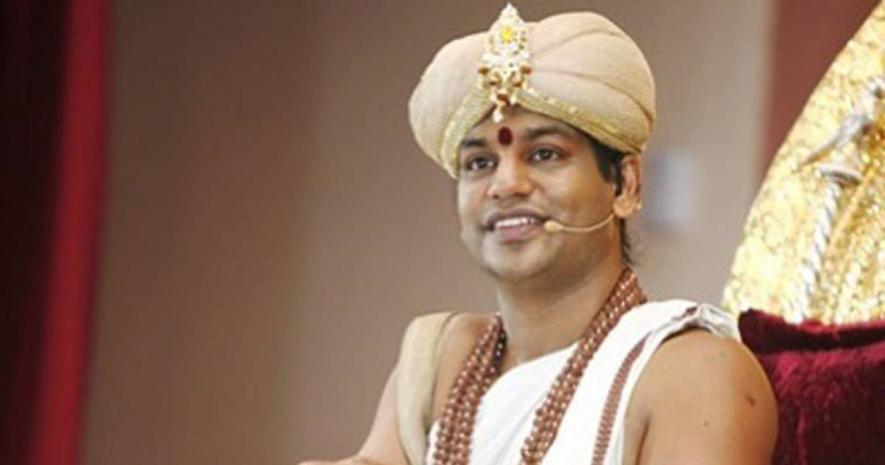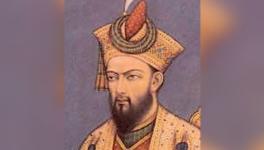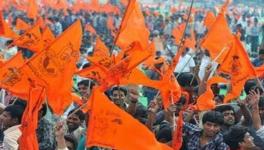Nithyananda’s Tropical Retreat and Faking Hindu Rashtra

Image Courtesy: National Herald
Religion is probably the most complex of human phenomena. For centuries philosophers, commentators and priests of all kinds have tried to understand and define it. One of the most comprehensive commentaries on religion is by Karl Marx, who wrote in a February 1844 critique of Hegel that “Man makes religion, religion does not make man... This state, this society produce religion, which is an inverted consciousness of the world, because they are an inverted world… Religion is the sigh of the oppressed creature, the heart of a heartless world, and the soul of soulless conditions. It is the opium of the people.”
The last phrase referring to religion as an opiate is very popular, but a fuller picture of Marx’s critique, the richness of his formulation, remains untapped until his reference to religion as a “sigh of the oppressed creature”, is also explored. These words come to mind today when religion, in its most aggressive form, is intervening in almost all spheres of daily life. On the one hand the politics to control oil resources has been built up in the name of quelling “Islamic terrorism”. Nationalism has been mixed with religion and blind faith has been intensifying too. So we find, perhaps unsurprisingly, that god-men and god-women are proliferating. The god-man phenomena is just a few decades old, but has been getting stronger, in particular over the last three decades.
While religion always had multiple roles, its principal function has been the creation of a clergy and saints. And, the clergy have through history supported those who were in power. Consider the combination of King and Pope, Raja and Raj guru or Nawab and Shahi Imam. Then there have been saints, such as those from the bhakti and Sufi movements in India, who stood by the average person, talked about or practiced humanism and opposed social inequalities.
Present-day godmen are unique in more ways than one, though they cannot complain about lacking state patronage. In today’s political scenario, their role is not exactly similar to the clergy of previous centuries. Today, godmen have supporters in the rich and in the not-so-rich alike. They speak in moral and spiritual tones, but most of them have an underbelly which, when exposed, clearly reveals suspicious goings-on. Dodging the law and carrying on illegal activities is the norm for many of them.
We see this new process unfold, though not for the first time, in swami Nithyananda. Born A Rajasekaran, he obtained a large following in India and abroad after he donned saffron robes. Like many of his ilk, rap, murder, torture and kidnapping charges have followed him throughout his career as a swami.
But, unlike others, Nithyananda has chosen an entirely new path to evade the long arm of the law. He has reportedly purchased an island in the Caribbean, close to the island cluster of Trinidad and Tobago, off the southernmost tip of South America, and absconded. After he bought the island from Ecuador, he named it Kailaasa and declared it a Hindu nation, a place where persecuted Hindus can buy citizenship at an exorbitant charge and practice the Hindu religion as Nithyananda imagines they should.
Quite ironically, considering controversial recent developments in India, Nithyananda has announced a new national flag, languages (Tamil, English and Sanskrit, not Hindi, another irony, not to mention that he has promised a rape-free new country) and he has cooked up a host of other symbols, displayed one the website of his purported nation. He has named a prime minster, a cabinet that will supposedly take decisions about the affairs of this “nation”.
A shared malaise
The tendency for godmen to thrive is not limited to Hinduism alone, though little is popularly known in India about god-men in Islam or Christianity, barring the likes of Benny Hinn, who proselytise and lecture via their own TV shows. However, politics in the name of [controlling or ending] Islamic, Christian and Buddhist fundamentalism is flourishing across the world, more so in West and South Asia.
In India, the self-styled godmen Rampal, Asaram Bapu and Gurmeet Ram Rahim ‘Insaan’ were arrested, but the state faced tremendous difficulty while trying to throw them in jail and even in convicting them. Thousands rioted and nearly three dozen people died when the police tried to arrest Ram Rahim, for instance.
One courageous journalist, Ram Chander Chhatrapti, had been bringing out details of the shady dealings that occurred within the Dera Sacha Sauda, which Ram Rahim ran in the fashion of a private empire. It is believed that revealing the dark side of the Dera led to Chhatrapati’s murder.
It was also reported that Ram Rahim’s Dera gathered Rs1.12 crore in donations from Haryana’s Bharatiya Janata Party (BJP) ministers and top leaders. At least 18 members of the BJP state cabinet visited his Dera, and individual party leaders and ministers profusely and publicly thanked him for his patronage, his support for their government’s public events, and also on personal occasions, such as Ram Rahim’s birthday.
Some time ago, an undated video was circulated of present Prime Minster Narendra Modi sharing a stage with Asaram Bapu at a public function. The video is from a time before Modi came into the national political frame, but he was a prominent figure in Gujarat politics at the time and most likely its chief minister. Many other prominent political heavyweights have made a beeline of Asaram’s ashrams. Similarly, Nithyananda does not lack the patronage and respect of powerful money-bags, many of them Gujarati.
Apart from the affluent followers who prop up these gurus are the ordinary folk—the kind who died protesting his arrest.
Recently, while I was on the road to Panipat, I was told that the jail where Ram Rahim is lodged was just a short distance away. If his devotees happen to be travelling down the same road, they stop at a spot nearby to pay their respects. It shook me that there was no regard among these people for the brave journalist, Ram Chander, who kept revealing the truth about this god-man despite the real threat to his life.
Then come the amorous escapades of these godmen, which can fill large volumes in any library if the narrations of their victims—who have come forward bravely to expose them. So, godmen come in various varieties. Specific groups specialise in certain kinds of tricks. For instance, we had a Sathya Sai Baba, who claimed to possess miraculous powers and sat over an empire worth at least hundreds of crores. Then we have Yoga guru Ramdev Baba, who transited from popularising Yoga (and supporting the BJP) to running the Patanjali enterprise, which got him among the wealthiest entrepreneurs and multi-national consumer goods giants.
There are fewer god-women but enough to make their presence felt. Consider Mata Amritanandamayi, Radhe Maa both of whom have made headlines.
Surely social scientists do not need to burn midnight oil to tell us what this phenomenon means for Indian society. Those named here are only the leading lights of the godman-godwoman explosion, the biggies among them. Their followers or chelas are often no better. There are hundreds or thousands of such people, each flourishing in the god-saint business, thanks to patronage of the powerful and affluent sections. Their supporters look away when these men and women whom they promote wreak havoc of any kind. The political parties, who use their influence over people to garner voters, also ignore their violations.
All this is happening in the name of faith and religion. Critiquing godmen does not go down well with their supporters. A powerful and vocal section of society is in awe of their allegedly spiritual powers. But most of all, it is the power that these people wield over ordinary people which insulates them from the consequences of their illegal and immoral deeds.
The author is a social activist and commentator. The views are personal.
Get the latest reports & analysis with people's perspective on Protests, movements & deep analytical videos, discussions of the current affairs in your Telegram app. Subscribe to NewsClick's Telegram channel & get Real-Time updates on stories, as they get published on our website.
























